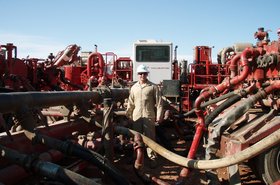Google plans to open a cloud region in Saudi Arabia in a joint venture with state-owned Aramco.
The state-owned company is the world's largest producer of oil, and has rights to the world's second-largest proven crude oil reserves.
A report by CDP and the Climate Accountability Institute found that Aramco was responsible for 4.5 percent of global industrial greenhouse gas emissions from 1988 to 2015.
Strange bedfellows
Google parent Alphabet began talks with the oil giant back in early 2018, originally envisioning a joint venture that would be listed on the stock exchange.
The new business would see the two companies collaborate on a large technology hub and build several data centers around the kingdom.
Negotiations reached the highest levels of both groups - with Saudi Crown Prince Mohammed bin Salman meeting with Google CEO Sundar Pichai, as well as Google co-founder Sergey Brin and Google’s VP of technical infrastructure, Urs Hölzle, then-head of Google’s cloud business, Diane Greene, and Google SVP Hiroshi Lockheimer, who heads Android, Chrome and other platforms.
Then, just a few months later, Washington Post columnist and US resident Jamal Khashoggi was murdered at the Saudi Arabian consulate in Istanbul. Saudi officials have belatedly admitted the killing was premeditated, but deny the Crown Prince was involved. Multiple intelligence agencies claim he ordered it.
In the wake of the state-sanctioned murder, Google distanced itself from Saudi Arabia. Then-Google Cloud CEO Diane Greene joined others in pulling out of Saudi Arabia's Future Investment Initiative Summit, also known as "Davos in the desert." Dan Doctoroff, CEO of Alphabet company Sidewalk Labs, also dropped out of the advisory board for a $500 billion Saudi megacity project known as Neom.
But negotiations continued.
"Building on that [2018 agreement], we concluded an agreement in December 2020 and Google Cloud will now deploy and operate a Cloud region in Saudi Arabia, while a local strategic reseller, sponsored by Aramco, will offer cloud services to customers, with a particular focus on businesses in the Kingdom," Google's senior product manager of GeoExpansion, Dave Stiver, said in a blog post.
In the same post, Stiver claimed that Google operates the cleanest cloud in the industry. "This commitment to sustainability enables our customers to meet their own cloud computing needs with zero net carbon emissions."
The company has repeatedly touted its climate credentials, but joins other cloud companies in offering services to fossil fuel companies.
An investigation by Greenpeace earlier this year found that AWS, Microsoft Azure, and Google Cloud provided custom-developed artificial intelligence and machine learning systems to help make it easier to dig up more climate change-exacerbating carbon.
Microsoft's contract with ExxonMobil, for example, could lead to emissions greater than 20 percent of Microsoft’s entire annual carbon footprint.
Following the report, Google said it would no longer “develop custom AI/ML solutions to facilitate upstream extraction” for the oil and gas industry. It will, however, continue its existing contracts (including with Chevron, Total, Schlumberger, and BP), and will provide custom solutions to midstream and downstream companies.
With the Aramco deal, Google claims that it will not directly involve workloads that facilitate oil extraction, although it was unclear about indirect hosting. The partnership will also create directly financial benefits for the oil company.
The other issue is that of human rights: Google's AI Principles prohibits work on AI systems “whose purpose contravenes widely accepted principles of international law and human rights.” Despite many well documented human rights abuses in Saudi Arabia, Google claims its partnership will not contravene its principles.




